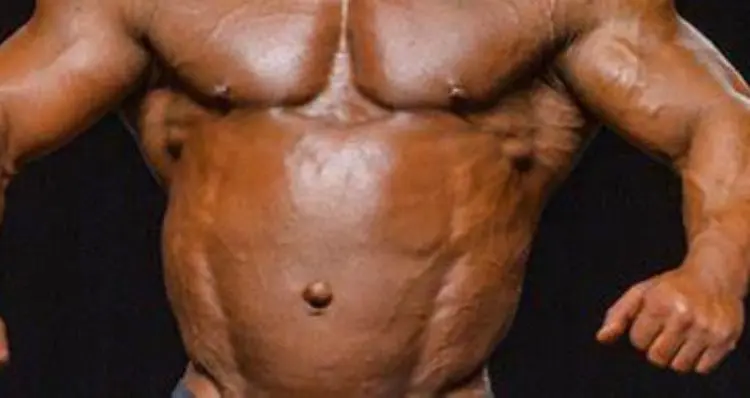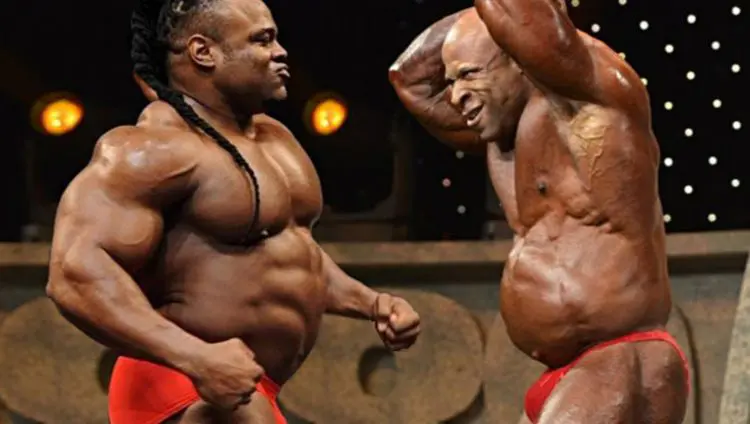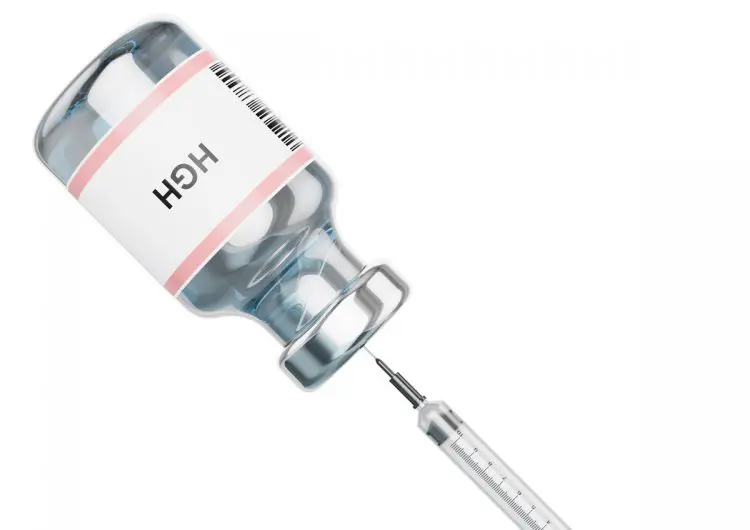Dave “Jumbo” Palumbo was a bodybuilder who really lived up to his name. Palumbo competed at a bodyweight of close to 300 pounds – ripped – making him one of the biggest bodybuilders around.
While Palumbo never turned pro, he still had a massive impact on the sport of bodybuilding, founding a supplement company (Species Nutrition) and starting RXMuscle, a hardcore online bodybuilding magazine. He’s also coached many pro and top amateur bodybuilders since his retirement from competition.
However, Palumbo’s biggest claim to fame is the start of the bubble gut phenomenon, which is often called Palumboism in his honor. That’s because Dave Palumbo was one of the first bodybuilders to be both ripped and have a large, distended abdomen.
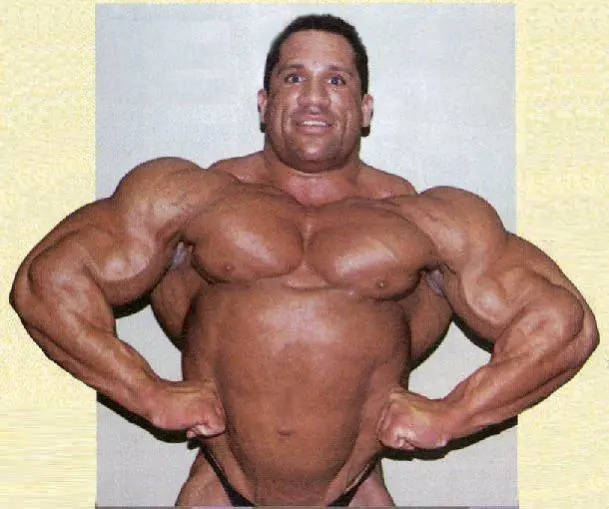
Since Palumbo retired from competition, more and more bodybuilders have been showing up on stage with Palumboism. Despite being absolutely ripped, these competitors have large waist measurements, which many people find less attractive than the classic V-taper from the golden era of bodybuilding.
In this article, we will discuss the causes and effects of Palumboism and how to avoid it.
What is Palumboism?
Palumboism is one of the terms used to describe bloating of the abdomen. It’s usually associated with human growth hormone (HGH) use, but there may be other factors involved.
Other names for Palumboism include:
- Bubble gut
- Bodybuilder belly
- Human growth hormone or HGH gut
- HGH bloat
- Insulin gut
- Muscle gut
- Steroid or ‘roid gut
Palumboism only really affects bodybuilders and is actually quite rare. However, it’s becoming more common within the professional ranks as competitors try and develop even more massive muscles.
Bodybuilders suffering from bubble gut can be very lean but still have a large stomach and may even be unable to pull their abdominals in, such as to perform a vacuum pose.
Abdominal bloating is usually caused by fat accumulation, fluid retention, or trapped air. But, with an HGH bubble gut, the cause is more likely to be excessive growth of the internal organs and thickening of the abdominal and oblique muscles (1).
The Causes of Bubble Gut in Bodybuilders
Because bubble gut is both rare and only tends to affect bodybuilders, there are no reliable studies that reveal the exact causes of this problem.
However, like all sports, bodybuilding goes through periods of change, and Palumboism only started to be an issue in the mid to late 1990s. It was at this time that bodybuilders started to experiment more with human growth hormone and insulin, so it’s safe to assume that one or both of the substances is the cause of abdominal distension.
Human Growth Hormone (HGH)
HGH is a naturally occurring hormone produced by the pituitary gland. As its name suggests, HGH is an anabolic or building hormone that plays an essential role in cell growth and renewal. It is also a potent fat burner.
HGH is often viewed as “the fountain of youth” as it may also slow down the aging process and improve the health and condition of the skin.
It’s popular with life extensionists and athletes alike and is thought to:
- Increase exercise capacity
- Improve bone density
- Build muscle mass
- Reduce body fat
- Faster recovery from injuries
However, of all the groups that use HGH, bodybuilders tend to use it in the largest amounts, which is why they tend to be the only people to develop a bubble gut. Bodybuilding doses of HGH are often ten times higher than those used therapeutically.
The problem is that your entire body responds to the effects of human growth hormone, so it not only leads to bigger muscles but larger internal organs too. This is what is thought to cause abdominal distension. Abuse of HGH can also cause the bones of the face to get bigger (2) and may even increase the size of the hands, feet, nose, and ears too.
Insulin
Insulin is another naturally occurring hormone. Made by the pancreas, insulin’s primary role is transporting nutrients (amino acids, glucose) from your blood to your liver and muscle cells. Bodybuilders use insulin to drive more nutrients into their muscles, enhancing muscle growth and speeding up recovery after training. Using exogenous (external) insulin may also enhance fat burning.
However, as a downside of insulin abuse, nutrients are also driven into the abdominal muscles, which may be another cause of stomach distension. Some also believe that insulin abuse causes increased fat storage around the internal organs and behind the abdominal wall, leading to more bloating.
Bodybuilders who use HGH often also use insulin as these two substances are synergetic, with each one increasing the potency of the other.
How to Prevent HGH Bubble Get
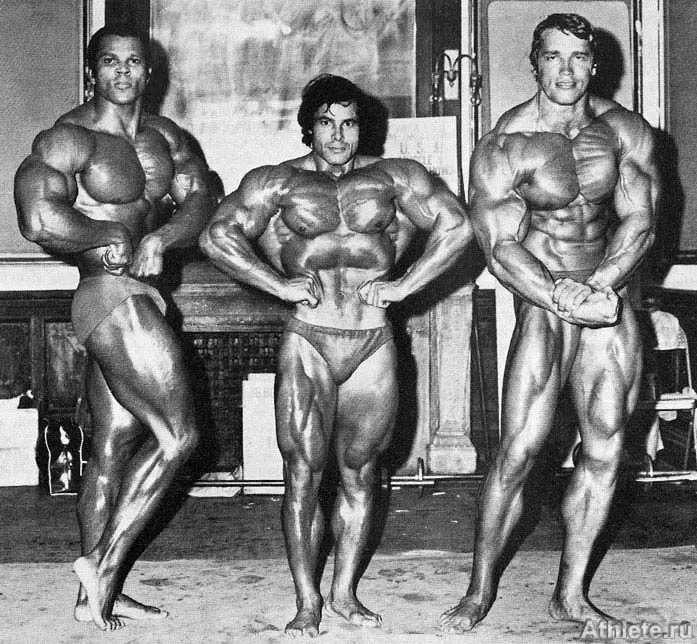
Given the suspected causes of Palumboism, the most obvious way to avoid it is to stop using exogenous human growth hormone and insulin.
As the physiques of yesteryear clearly demonstrate, testosterone-based anabolic steroids are not responsible for bubble gut, as they’ve been in use for well over 50 years. Back in the golden era of bodybuilding, competitors used steroids and yet often had very small waists and no abdominal distension.
So, if bodybuilders stop (or never use) HGH and insulin, bubble guts should no longer be a problem. However, it’s important to note that the tissue affected by HGH will not return to normal. If your internal organs or bones grew due to HGH abuse, that’s the way they’re going to stay. That said, muscles will shrink if you stop training or stop taking other anabolic steroids, even if growth was fueled by HGH.
Because bodybuilders will undoubtedly continue using these substances, maybe a more conservative approach would cause less distension. Using HGH and insulin for short cycles may mean fewer unwanted side effects. So, rather than using them all year round, consider saving HGH and insulin for use during the lead-up to competitions only. This would also be a safer approach.
A lower-carb diet and intermittent fasting may reduce bubble gut, particularly the issues by exogenous insulin. Avoiding things that cause bloating could also help, such as gluten, sugar, and lactose. However, compared to HGH and insulin, the impact of these substances is very small.
TIP: Try intermittent fasting calculator to help you cycling between eating and fasting.
Boosting HGH Levels Naturally
Human Growth Hormone is very much a double-edged sword. On the one hand, it can help you build muscle, lose fat, and make you look and feel younger. Taking growth hormone may help you recover faster from your workouts and overcome injuries more quickly.
On the downside, in addition to developing a bubble gut, your internal organs may become dangerously enlarged, your bones could grow, and your nose, ears, hands, and feet might get bigger.
However, these side effects are linked to HGH abuse. Naturally raising your growth hormone levels could be very beneficial and without significant risk.
Ways to safely raise your HGH levels naturally include:
1. Lose fat

High levels of body fat impede HGH production. Lowering your body fat levels should produce a small but meaningful rise in HGH, especially in men (3).
2. Try intermittent fasting
Skipping meals can increase HGH production. Intermittent fasting increases HGH production by helping you lose fat and lowering your insulin levels. Insulin spikes appear to disrupt natural HGH production (4). Eating less sugar and fewer refined carbs will also help, as will avoiding eating late at night.
3. Train hard
Exercise is one of the most effective ways to increase HGH production. High-intensity strength and interval training are considered two of the best ways to raise your HGH levels naturally (5).
4. Sleep more
The majority of your HGH is produced while you sleep. Getting more sleep will provide your body with more time to release human growth hormone. Take all the necessary steps to ensure you get at least eight hours of sleep per night (6).
5. Consider using some supplements
There are several supplements that may increase human growth hormone production, including:
- Arginine
- Beta-alanine
- Creatine
- GABA
- Glutamine
- Glycine
- L-dopa
- Melatonin
- Orthenine
You don’t need (and probably shouldn’t) take all of these substances, so just choose 1-3. Use them according to the manufacturer’s directions, and only if your doctor says it is safe for you to do so.
HGH Bubble Gut – Wrapping Up
Palumboism and bubble guts have become part and parcel of professional bodybuilding. And for as long as mass is celebrated and rewarded by the judges, HGH and insulin use are sure to continue. One way to discourage HGH and insulin use would be to penalize competitors with distended stomachs, but that’s probably not going to happen anytime soon.
Drug use is endemic in professional and amateur bodybuilding, and it’s each competitor’s choice to use, abuse, or avoid performance-enhancing drugs. However, given the negative impact of HGH and insulin on bodybuilding aesthetics, it’s easy to see why a lot of people would love to see these drugs banned.
But, until that happens, we’re just going to have to accept that bubble guts are part of the current bodybuilding scene.
References:
1. PubMed: Bloating and Abdominal Distension: Old Misconceptions and Current Knowledge (source)
2. PubMed: Growth Hormone Therapy and Craniofacial Bones: A Comprehensive Review (source)
3. PubMed: Novel Relationships of Age, Visceral Adiposity, Insulin-Like Growth Factor (IGF)-I and IGF Binding Protein Concentrations to Growth Hormone (GH) Releasing-Hormone and GH Releasing-Peptide Efficacies in Men during Experimental Hypogonadal Clamp (source)
4. PubMed: Fasting: The History, Pathophysiology, and Complications (source)
5. PubMed: Impact of Acute Exercise Intensity on Pulsatile Growth Hormone Release in Men (source)
6. PubMed: Growth Hormone Secretion During Sleep (source)
Tip: If you're signed in to Google, tap Follow.



